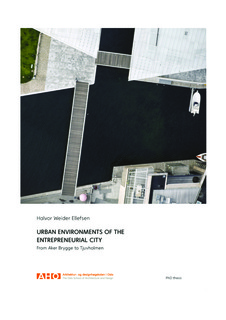Urban environments of the entrepreneurial city : from Aker Brygge to Tjuvholmen
Doctoral thesis
Permanent lenke
http://hdl.handle.net/11250/2441530Utgivelsesdato
2017Metadata
Vis full innførselSammendrag
The focus of this thesis is the regeneration of industrial harbor and brownfield areas to properties primed for urban development along the urban waterfront of Oslo, Norway. The project revolves around an empirical study of Tjuvholmen, a privately operated waterfront development scheme, centrally located in the city. The point of departure for the thesis is to explore how Tjuvholmen was conceptualized as urban environment, within a particular model of political-economic conduct, to better understand the relation between the current-day urban development policies and the urban form of waterfront redevelopments.
The thesis frames the case study in a historical framework of political, economic and disciplinary practices in Oslo, tracing urban waterfront redevelopment in Oslo from the late 1970s. A specific emphasis lays on the area Aker Brygge, developed within a similar model of conduct 25 years earlier. The comparative study of Aker Brygge brings insights to the relations between architectural practice forms, political economic practices, and the project-based development strategies that characterize Oslo’s urban waterfront today. The project relates to a broad scope of urban research that scrutinizes forms of fragmentation, gentrification and aesthetics of urban landscapes, within the political-economic context of what David Harvey has labeled “the entrepreneurial city,” but is fundamentally based on a
morphological approach to research on the city. The aim is to disclose how ideals and interpretations of the city affect Tjuvholmen as urban environment, and expose the dynamics of architecture and urban form within entrepreneurial forms of urban planning and governance.
